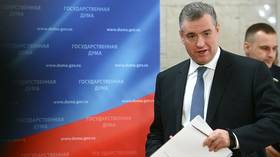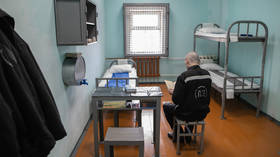Russian party leader urges return of death penalty

Russia should reintroduce the death penalty after a bomb attack in St. Petersburg killed a popular military blogger and injured dozens of others, the leader of the nationalist LDPR party has argued.
“What has happened to our comrade Vladlen Tatarsky, the things that are happening now on the sidelines of the special military operation [against Ukraine], call on our hearts to review [the current moratorium],” Leonid Slutsky said during a parliamentary session on Tuesday, as quoted by Russian media.
Military blogger Tatarsky, whose real name was Maksim Fomin, was assassinated on Sunday when a bomb disguised as a figurine went off at an event at a café in central St. Petersburg.
Russian police later arrested 26-year-old Darya Trepova, who confessed to bringing the explosive device to the meeting as a gift to Tatarsky. Trepova is suspected of being part of a terrorist conspiracy, although she claimed during a police interview that she was deceived by her handler. Moscow has accused Kiev of being the likely mastermind behind the attack.
The Russian criminal code technically allows courts to sentence male convicts to capital punishment for a handful of the most serious crimes, but there is a de facto ban on applying it.
The last time a person was executed in Russia was in 1996, the same year that Moscow pledged to impose a moratorium as it joined the Council of Europe. The international human rights body prohibits members from carrying out death sentences.
While Moscow was in the process of withdrawing from the council last year, the deputy chair of the Russian National Security Council, Dmitry Medvedev, suggested that his country could reintroduce capital punishment.
Public figures across the political spectrum have claimed in the past that Russia could benefit from such a move, suggesting that high-profile embezzlers, pedophiles, child murderers, and terrorists are all criminals who potentially merit capital punishment.
The idea has staunch opponents as well, including the chair of the Constitutional Court, Valery Zorkin. He has argued that Russian legal practice de facto includes the right not to be sentenced to death. He has also claimed that restoring the death penalty would be unconstitutional, and thus require a basic new law to be adopted first.













